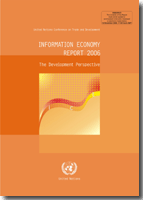Gap in broadband internet technology hurting poorer nations, says UNCTAD report
22-11-2006 (New York)

Broadband Internet technology has become so valuable to businesses that developing countries with scarce access or a lack of infrastructure to provide it at reasonable cost are suffering a major competitive disadvantage, according to a new report from the United Nations Conference on Trade and Development.
The annual report on the state of the information economy around the world, released yesterday, found that broadband directly boosts competitiveness and productivity and could contribute hundreds of billions of dollars a year over the next few years to the gross domestic products (GDPs) of developed countries.
Broadband – which offers users a much higher rate of data transmission than a dial-up connection – has become so vital to companies that it is now being compared to utilities such as water and electricity, according to the report. It allows companies to engage in more sophisticated e-business processes and deliver a greater range of products and services.
But the gap between rich and poor is widening, with the number of broadband subscribers in affluent countries surging by 15 per cent to 158 million in the last half of 2005, and the greatest rise in connectivity reported by business users. In the European Union (EU), 63 per cent of businesses now have broadband.
However, less than 1 per cent of enterprises in 48 of 71 developing countries studied had broadband rather than dial-up Internet connections.
The report states that while the growth of broadband is due mainly to competition and falling prices, it also depends on available infrastructure and many poorer nations lack the economies of scale to make expanding broadband an attractive proposition for investment, particularly in rural areas.
Broadband – which offers users a much higher rate of data transmission than a dial-up connection – has become so vital to companies that it is now being compared to utilities such as water and electricity, according to the report. It allows companies to engage in more sophisticated e-business processes and deliver a greater range of products and services.
But the gap between rich and poor is widening, with the number of broadband subscribers in affluent countries surging by 15 per cent to 158 million in the last half of 2005, and the greatest rise in connectivity reported by business users. In the European Union (EU), 63 per cent of businesses now have broadband.
However, less than 1 per cent of enterprises in 48 of 71 developing countries studied had broadband rather than dial-up Internet connections.
The report states that while the growth of broadband is due mainly to competition and falling prices, it also depends on available infrastructure and many poorer nations lack the economies of scale to make expanding broadband an attractive proposition for investment, particularly in rural areas.
Related themes/countries
· United States of America: News Archives
Share this story:
Contact information
- United Nations
Source














